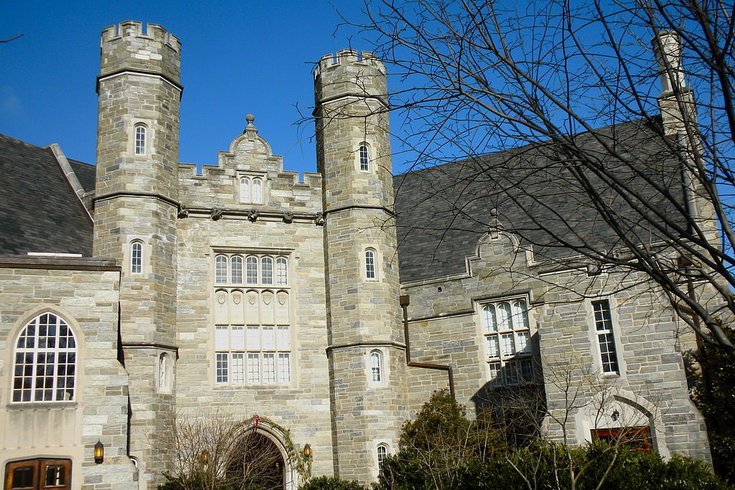
April 15, 2022
 Smallbones/Wikimedia Commons
Smallbones/Wikimedia Commons
Basic in-state tuition will remain at $7,716 for the upcoming 2022-23 academic year, the PASSHE said Thursday. Above is a file photo of West Chester University.
Pennsylvania students attending one of the 14 state-run universities will not see a tuition increase for a fourth straight year.
Basic in-state tuition will remain at $7,716 for the upcoming 2022-23 academic year, the Pennsylvania State System of Higher Education's Board of Governors voted at its quarterly meeting on Thursday. The state education agency's annual technology fee for in-state students will also remain at $478.
This is the first time that the PASSHE has frozen basic in-state tuition for four consecutive years, according to the agency.
However, PASSHE leaders said that additional state funding from Harrisburg is necessary to keep schools from having to raise costs on students in the future.
The agency's Board of Governors requested $550 million in state funding last October for the upcoming 2022-23 fiscal year in order to offset a possible tuition increase. The PASSHE is also seeking $201 million in student aid and at least $75 million in federal funding that Gov. Tom Wolf and the General Assembly have committed to the state-owned universities.
The funding proposals are part of Wolf's 2022-23 fiscal year state budget. Wolf's budget calls for a 15% increase, or $75 million, in general funds for the PASSHE and $150 million in one-time federal funds.
"The governor believes that PASSHE schools must be affordable, high quality and responsive to community and workforce needs across the commonwealth," a Wolf administration spokesperson said in a statement. "Support for PASSHE is an investment in local communities, as the majority of graduates stay in Pennsylvania following graduation."
Pennsylvania ranks 46th in the nation in terms of investment per student in state-owned, four-year universities, according to the PASSHE. State funding has declined by 35%, or $252 million, over the last 20 years.
"Just freezing tuition is not a sustainable strategy without meaningful investment from the commonwealth," PASSHE Chancellor Daniel Greenstein said. "Pennsylvania must invest in its state-owned universities if we want them to continue providing the high-quality, affordable education they were born to deliver."
Additional investments in Pennsylvania's state-run universities would help the PASSHE keep high-quality public education accessible and affordable to more residents, according to the agency.
"Pennsylvania’s economy depends on the talented and well-educated graduates from the state-owned universities, and we are focused on providing a quality and affordable public education to students of all backgrounds," said Cindy Shapira, the chair of the PASSHE's Board of Governors. "We are hopeful the legislature supports our funding request so we can maintain the tuition freeze. With all of the other rising costs in our economy, working families should not have to worry about paying more for tuition at a public university."
The PASSHE has had to do its own financial housekeeping in recent years to prevent an uptick in costs for in-state students. The agency said it has cut more than $173 million in operating costs and waived at least $63 million in tuition over the last three years, all while dedicating $100 million towards student aid.
About 90,000 students attend one of the 14-state owned universities across the state, making the PASSHE the largest producer of bachelor's degrees in Pennsylvania. The agency conferred nearly 24,000 academic degrees and certificates last year.
More than 88% of the student body lives in Pennsylvania, and 78% of graduates are working in the state within three years after graduation.
Total costs for in-state undergraduates living on campus can reach as high as about $23,000, according to PennLive. Students typically graduate with about $39,000 in student debt, according to the Associated Press.
Out-of-state tuition is set by the individual schools, and the technology fee for out-of-state students stands at $728, the Inquirer reported.
Enrollment within the PASSHE has steadily declined for more than a decade. But the agency experienced its biggest dip in more than two decades last year when more than 5,000 students left. The 5.4% decline in enrollment during the 2020-21 academic year was the highest percentage of students lost in more than 20 years.
PASSHE officials have cited the COVID-19 pandemic and the system's in-state tuition costs for the massive plummet in student enrollment.
The tuition freeze also comes amid a consolidation of six state-run universities into two regional schools.
Bloomsburg University, Lock Haven University and Mansfield University in Northeast Pennsylvania will combine to become Commonwealth University on July 1. California University, Clarion University and Edinboro University will merge to form Pennsylvania Western University, or Penn West, this summer, too.
These consolidations are said to be mainly administrative and cost-saving moves. Each school's campus will retain its individual name and traditions for marketing and diploma purposes.
The mergers will allow for the continuation of certain academic programs and help each individual school stand on more solid financial footing by operating as one legal entity, according to the PASSHE. State officials are also hopeful it could help boost student enrollment.
Both consolidations received accreditation approval in March from the Middle States Commission on Higher Education.
The agency's two schools in the Philadelphia region are West Chester University and Cheyney University.
Follow Pat & PhillyVoice on Twitter: @Pat_Ralph | @thePhillyVoice
Like us on Facebook: PhillyVoice
Add Pat's RSS feed to your feed reader
Have a news tip? Let us know.